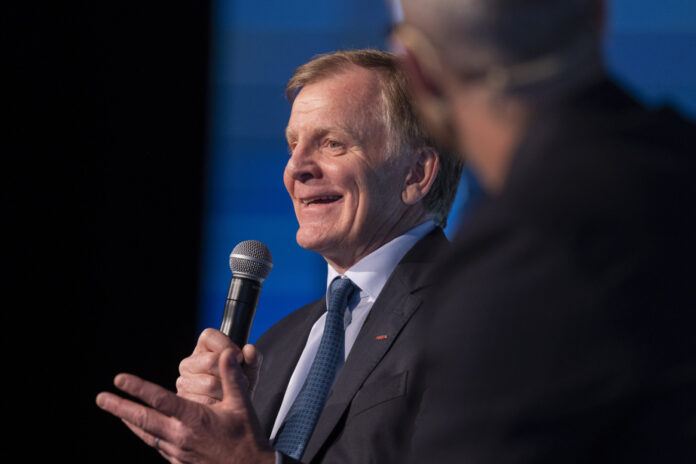The new Canadian code of conduct for grocers, the final version of which should be determined in the coming weeks, should help improve the relationship between suppliers and grocers, believes Metro President and CEO Eric La Flèche.
The big boss of Metro recognizes that relations with certain suppliers have experienced moments of tension. “Not everyone, in general, relations are good,” he nuanced in a press scrum on Thursday, on the sidelines of a speech before the Canadian Club of Montreal.
Metro and other industry members have worked to develop a voluntary code of conduct. A proposal for a final version is currently undergoing a consultation process until May 30.
The document includes a process for resolving disputes. While it does not provide for the imposition of fines, a number of potential disincentives to encourage compliance, such as potentially communicating “bad behavior” to the public, are provided.
The industry-led code of conduct for grocery stores has been proposed as a way to address longstanding issues such as arbitrary fees, cost increases imposed without notice and late payments.
“I think what’s in there is going to be good for having more transparency and then things are going to be clearer between the different players,” comments Mr. La Flèche.
By offering guidelines, the code will provide a guide to conduct that will help reduce “nasty surprises” and “one-sided decisions,” according to the leader.
He gives an example of undelivered orders as a situation that would be clarified by the code. “When we place an order that isn’t filled, then we can’t deliver to the store and we frustrate our customers because we don’t have the product, what happens?” Can we charge a penalty? If so, under what circumstances. Then it will be clearer for everyone.
“Nobody wants to be imposed unilateral increases for nothing, without justification,” he adds. They [the suppliers] do not want to be charged unilaterally, without justifying either. So it’s negotiation that will be transparent. I think it should work. »
Metro denies having unilaterally imposed fees on its suppliers in the wake of the launch of the new loyalty program Me. In January, suppliers expressed their frustrations with the fees charged to participate in the program, in an article by La Presse.
“It’s not an imposed fee,” says the leader. It is a voluntary program. There is not a supplier who is forced to do business with us and then embark on the Me program. It is sure that he will perhaps do better business with us if he participates in the program. »
The testimonies of disgruntled suppliers would not reflect the mood of the majority, judge Mr. La Flèche. “Most go into this with a smile and enthusiasm. »
The update of the loyalty program extends its reach to the company’s other brands, including the Jean Coutu and Première Moisson pharmacies.
The program would make it possible to better target the behavior of customers who visit more than one brand of the Montreal society. “We think we offer more to our suppliers, says the boss of Metro. We have richer information through our network. It’s worth something. If vendors want access to that, well, that’s worth something. If they want to work targeted promotions with us, that’s worth something. »
During his lecture, Mr. La Flèche said he saw signs of moderation, but would like the price spike to die out sooner.
In response to critics who have blamed grocers for rising food prices, he reiterated that groceries are the last link in the supply chain. Rising prices are visible at the grocery store, but inflationary pressure is present at every stage, such as production and transportation, he points out.
In fiscal 2022, Metro had nearly 27,000 requests for price increases of more than 10% on average from its suppliers for dry foods alone (which excludes meat and fresh fruits and vegetables ), reported the leader last January.
Since then, he says he sees signs of moderation. “The quantity of requests is going down, the rate of increase in demand has also gone down,” he said in a press scrum. There are still some, but it is definitely a sign of slowing increases. »





